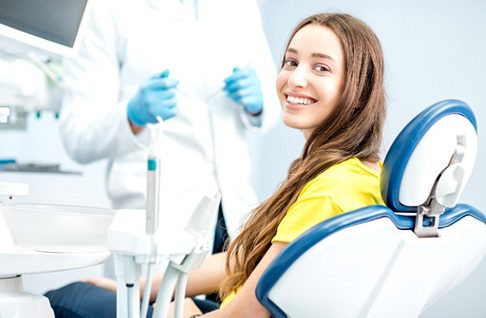EMERGENCY DENTIST — FORT WORTH, TX
Urgent Dental Care When You Need It
Dental emergencies always happen at the most unexpected moments, which is why it’s so important to be prepared. If you ever have to deal with a surprise toothache, broken tooth, lost restoration, or anything else that constitutes a dental emergency, don’t hesitate to call our team at Hulen Crossing Family Dental. Drs. Hu and DeSimone can help get you out of pain and restore the health and structure of damaged teeth with emergency dentistry in Fort Worth, TX. For urgent dental care when you need it most, don’t hesitate to call Hulen Crossing Family Dental!
Why Choose Hulen Crossing Family Dental for Emergency Dental Care?

In-House Oral Surgeon &
General Dentist

Same-Day Emergency
Appointments Available

3 Types of Dental Sedation
for Maximum Comfort
What to Do in a Dental Emergency
In the face of a dental emergency, it’ll be important to act fast and be prepared. The first step you should always take is to call our dental office immediately. One of our team members can help minimize your discomfort and prevent additional oral damage by providing over-the-phone first-aid guidance for your specific situation. We’ll then schedule an appointment for you to get you out of pain and protect your smile, often within the same day you call.
When you arrive, your Fort Worth emergency dentist Dr. Hu or Dr. Desimone will see you right away for an exam. Their first priority will be to stabilize your condition if necessary and get you out of any pain you may be experiencing. Then, they’ll evaluate your situation to learn the extent and source of your emergency. Once they’ve explained their findings to you, they’ll review all your treatment options and help you choose the one that’s best for you. Once you’ve created a treatment plan, our talented and experienced team will get to work right away to get your oral health back on track.

The Most Common Dental Emergencies
TOOTHACHES
CHIPPED TOOTH
CRACKED TOOTH
SENSITIVITY TO HOT & COLD
KNOCKED-OUT TOOTH
LOST FILLING OR CROWN
BROKEN DENTURE
LOOSE TOOTH
GUMS, LIPS OR TONGUE INJURY
JAW PAIN OR CLENCHING
SOMETHING STUCK BETWEEN TEETH
Understanding the Cost of Dental Emergencies
EVERY DENTAL EMERGENCY IS DIFFERENT
If you chip your tooth, there’s a good chance your treatment will be vastly different than someone who knocks out a tooth and requires replacement. This is just one of the reasons our team at Hulen Crossing Family Dental cannot provide a cost breakdown before an appointment. Once you call our office and alert us to your problem, we will work to get you in as quickly as we can.
From there, we will examine the problem area and provide a personalized treatment plan to get your smile back on track. Only then will you be able to fully understand how much you can expect your treatment to cost.
DOES DENTAL INSURANCE COVER DENTAL EMERGENCIES?
If you review your policy, there may be mention of your insurance company covering one emergency exam each year. While this is not the case for all insurance plans, you are advised to review your policy to better understand its rules. Fortunately, even if you are not covered for an emergency exam, these visits are often not very expensive.
The majority of the cost comes from the type of treatment you need. Since most insurers agree to cover 50-80% of the total cost of minor or major restorative care, you can breathe a sigh of relief.
OTHER OPTIONS FOR MAKING DENTAL EMERGENCIES AFFORDABLE
Kleer Membership Plan : Whether you choose to pay a one-time annual fee or month-to-month, you can receive access to basic dental care as well as discounts on all other available services offered in-house.
Flexible Financing : Through CareCredit, you can apply for low or zero interest financing. This makes it possible for you to stay within your budget while making your monthly payments toward the care of your smile.
TAKING CARE OF YOUR SMILE CAN SAVE YOU MONEY
While it is impossible to avoid all dental emergencies, there are steps you can take to minimize your risk and prevent certain problems from occurring (i.e., nagging toothaches, gum disease, cavities, etc.). Not to mention, it is your responsibility to seek help from an emergency dentist in Fort Worth the moment you begin to notice a problem. The longer you wait, the greater the risk for more advanced and extensive dental procedures.
By choosing to be proactive about your oral health (i.e., oral hygiene routines, eating healthy foods, avoiding bad habits, keeping regular six-month appointments), you can spend more time enjoying your smile instead of having work done to fix it.


